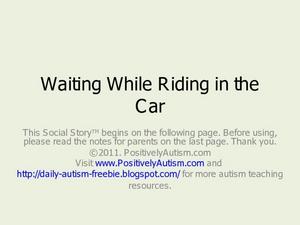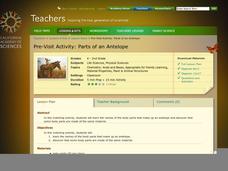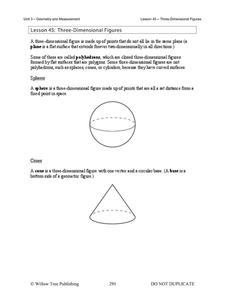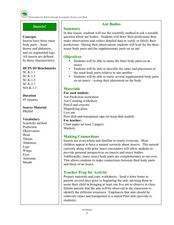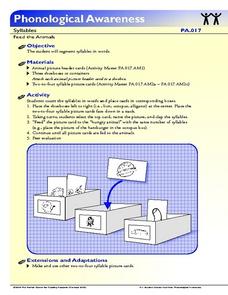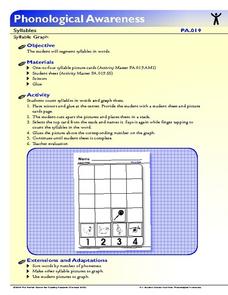Curated OER
Taxonomy
Biology novices name the seven levels of classification and use binomial nomenclature for naming living organisms. The first half of this presentation bestows a brief history of taxonomy, while the second half instructs on how to use our...
Curated OER
Pronouns
Pronouns are a very common part of speech. Young readers are exposed to words such as: he, her, I, we, they, and she. They realize that a pronoun can replace the name of a person, or an object. The last slide challenges pupils to work...
Curated OER
Pattern Block Barrier Game
Challenge your learners to give clear and concise directions in this shape-name practice activity. In partners, they place a dividing "wall" between them, with pattern blocks and a grid on each side. Partner A places one block at a time...
Florida Center for Reading Research
Phonological Awareness: Phoneme Segmenting and Blending, Picture Slide
A hands-on activity challenges young scholars to name a picture, segment its phonemes, then blend those sounds to make the word.
Florida Center for Reading Research
Fluency: Letter-Sound Correspondence, Make a Match
A memory activity engages young learners in letter-sound correspondence. Pairs take turns examining two sets of cards lying face down. They flip one image card and one letter card, then name the initial sound. If the sounds match, pupils...
Curated OER
Sound Blending Lesson Plan
Mr. Snowman wants to help emerging readers understand compound words, so he segments some familiar words to help them see that they are made of two distinct words. Learners repeat the words, both segmented and blended, and observe them...
Positively Autism
When I Feel Angry
Everybody feels angry sometimes, and it can be hard to know how to handle such a big emotion. This story was written with a learner with autism in mind. It provides clear guidelines the child can follow when he is feeling upset or angry....
Positively Autism
Waiting While Riding in the Car
Traffic and stop lights can be a bother for even the most patient person, but when you have autism, that extra time spent in a hot car can be a real nuisance. Here is a great story that addresses the need to be patient while waiting or...
National Book Network
A Day with No Crayons
Colors and crayons are the inspiration for this collection of activities! Kids illustrate the real world, come up with their own names for colors, make their own crayons (with teacher assistance), create artwork they can eat, and more.
California Academy of Science
Parts of an Antelope
There are so many wonderful parts to an animal: fur, antlers, tails, and legs, to name a few. A large diagram of an antelope is used to start a matching game, where the class matches body parts made of the same material. They discuss...
Freeology
Testing Do Not Disturb Door Hanger
Shelter your class from outside noise by indicating that your class is testing with a tag for your door. There are two tags on the page and space to cut out a hole for the door handle. Since the resource is a Word document, you can...
Ms. Winston
Parent Communication Log
Clean and simple, two words that accurately describe this log for parent communications. Print up one for each student, add the names of the student and the caregiver contacted, the date, the method of contact, the reason for the...
ESL Kid Stuff
Intro ESL Lesson (Ages 8-14)
Introduce language learners to class behavior expectations, and each other, with activities that include greeting and name games, conducting a class survey, and creating a classroom rules poster.
Student Handouts
Student Information Sheet
Stay in contact with the parents of your classroom with a student information sheet. It provides spaces for learners' information, including name, date of birth, photo, and class period. Two more sections have spaces for parent contact...
Willow Tree
Three-Dimensional Figures
Time to move into the third dimension! Learn the names of the geometric solids and count faces, edges, and vertices. Then learn to recognize nets that create a given solid.
Goodwill Community Foundation, Inc.
Meeting New People
Find out your conversation partner's name, job, place of origin, and current residence with a straightforward Spanish practice guide. Learners click on audio icons to hear the proper pronunciation of ¿Como te llamas? and ¿De...
Curated OER
Anishinabe - Ojibwe - Chippewa: Culture of an Indian Nation
Students investigate the American Indian tribe of the Chippewa. They identify the different names of the Anishinabe/Ojibwe/Chippewa nation, conduct a research project, explore various websites, and present their group research projects.
Bellevue College
Practice Drawing Lewis Structures
Twenty-six elements, compounds, and ions are randomly listed for chemistry whizzes to analyze. They are to diagram the Lewis electron dot structure for each, resulting in further insight on the configuration of different molecules. They...
Curated OER
Angle Relationships
Over the course of 18 problems, learners identify angles as complementary, supplementary, vertical or adjacent. They name relationships in angles such as alternate interior, corresponding, and alternate exterior angles. They apply the...
Curated OER
Things in a Line
Little learners recognize symbols, objects and how to depict numbers. In this matching lesson, they can match the number names with a set of items, model ordinal numbers, and complete a cute, cartoon-character worksheet.
Curated OER
Ant Bodies
Students name the three parts that comprise an insect body. For this ant lesson, students make connections regarding the curiosity of insects as it touches upon the students' personal perspectives. Students then observe ants in...
Curated OER
Metric System Basics
Do your learners know that there are different systems to measure length, volume, and weight? Explain metric measuring and its base ten decimal system using this comprehensive set of worksheets! For all three types of measurement,...
Florida Center for Reading Research
Phonological Awareness: Syllables, Feed the Animals
An activity challenges scholars to sort picture cards based on the number of syllables they count as they say the item's name on each card. Depending on how many syllables they count, they place the card in the corresponding box...
Florida Center for Reading Research
Phonological Awareness: Syllables, Syllable Graph
Scholars make a pictograph based on the number of syllables in each picture card. They choose a card, say the name of the object on the card, break the word into syllables, count the syllables, then glue the picture onto the number chart...
Other popular searches
- Body Part Names
- Animal Names
- Dinosaur Names
- Astronauts Names
- Place Names
- Body Parts Names
- Imaginary Planets Names
- Baby Animal Names
- Dinosaur Names and Pictures
- Musical Note Names
- Dolphin Scientific Names
- Learning Names for Colors







